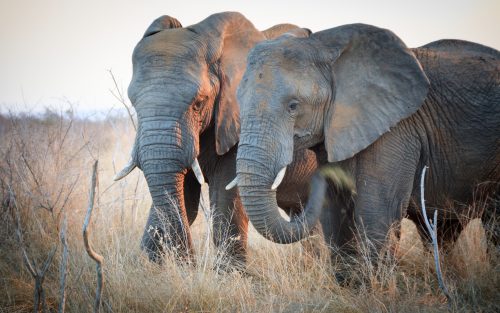
Much has already been written and said about the severe damage to the elephant population. The elephant population in Africa as well as in Asia is severely damaged by poaching, hunting that satisfies the criminal demand for elephant tusks that are used to make ivory objects. Despite laws and regulations, despite the tightening of supervision and conservation actions, the poaching continues and thousands of elephants are killed every year.
But there is another factor that causes damage to elephants, and that is farmers, since elephants that "invade" fields cause serious damage to crops. In many cases the elephants enter settlements and cause destruction to buildings and from time to time there are reports of people being harmed by elephants. Despite the general trend in which residents understand the importance of preserving nature, the constant friction between residents in rural settlements and the elephants causes feelings and moreover violent activities against the elephants. Added to this is the common practice in African countries of shooting elephants that invade fields and settlements, a killing that is added to the wild poaching that is making a name for itself in the elephant population.
For a long time, people have been looking for different and different measures that will cause the elephants to be rejected, measures that will scare, run away or repel the elephants from fields and villages. There were those who offered electric fences, but the cost of fences is high. Several years ago, farmers in Kenya began to scatter beehives around their fields. Bees react aggressively to the ground vibrations caused by the march of the elephants. The elephants are afraid of the bees and the (nervous) buzzing of a swarm of bees is enough to drive elephants away from the field.
Now, a new "patent" developed in research in Botswana by Rocío Pozo from Oxford University and published in the monthly Oryx (Oryx), is described as a "cheap and great method" that will allow farmers to keep elephants away from their crops. The method is based on burning bricks made from a mixture of dry chili, manure and water, and relies on the sharp and sensitive sense of smell of elephants, which are repelled by pungent smells.
Farmers who burn the bricks around their fields will prevent elephants from invading and "robbing" crops. This will reduce the friction between the farmers and the elephants and allow the farmers to collect a crop that will feed and provide for their families.
Elsewhere I told about the common use of farm animal manure as a fuel. When chili concentrate and a little water are added to the manure, they form bricks. After drying in the sun, the bricks can be burned when the smoke gives off a spicy chili smell. Alternately, the researchers suggest to farmers to plant chilies around the fields and thus earn twice, the elephants will not harm the crops and at the end of the growing season the chili fruit can be collected and sold.
The researchers praise the method as "non-lethal", cheap and as one that will prevent friction between elephants and farmers. The distribution of the "patent" among farmers will help protect elephants whose population has been falling in recent decades due to wild poaching.
The research was done in Botswana in the strip east of the Okavango Delta (Okavango. e), an area where there is competition for resources, land and water between about 15000 elephants and a similar number of settlers, a competition in which a farmer may lose an annual crop in one night due to an elephant invasion. If in such a problematic area the method gave a solution then it has chances of success.
Botswana has the largest population of elephants in Africa, and the research is being carried out with the dual goal of enabling elephants and farmers to live side by side, where they will also have nutritional security without mutual harm.
See more on the subject on the science website:
